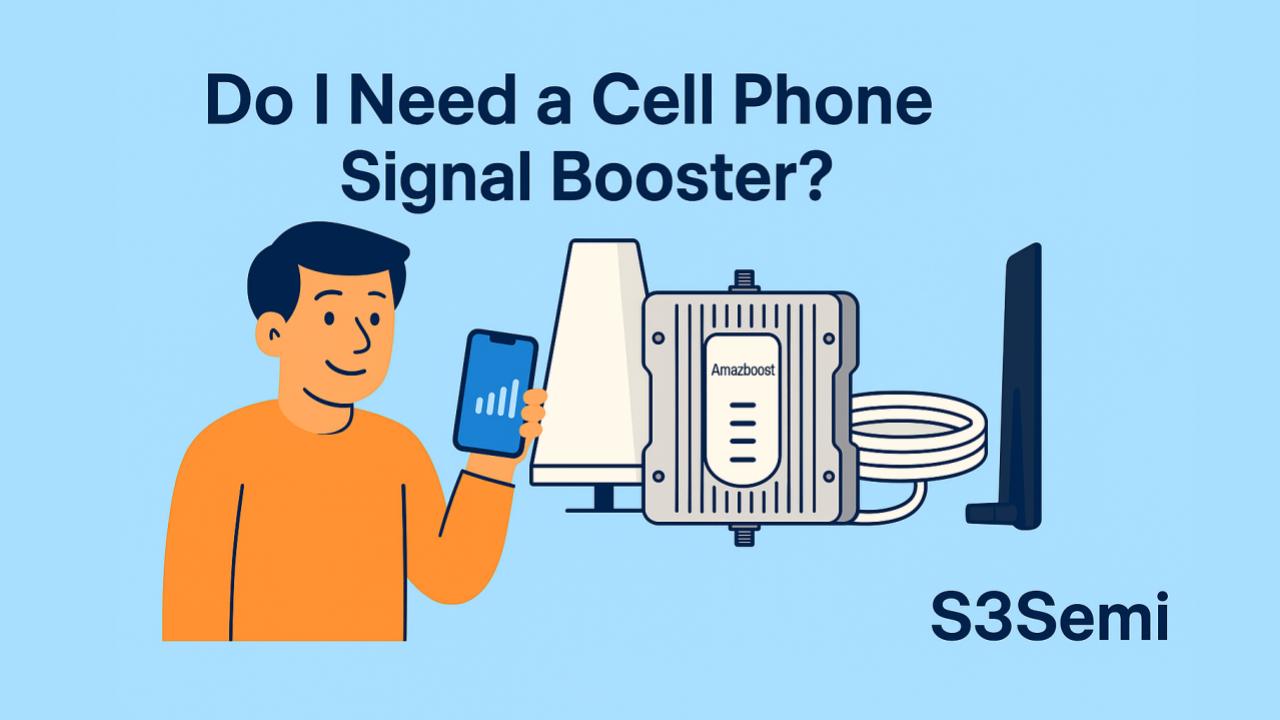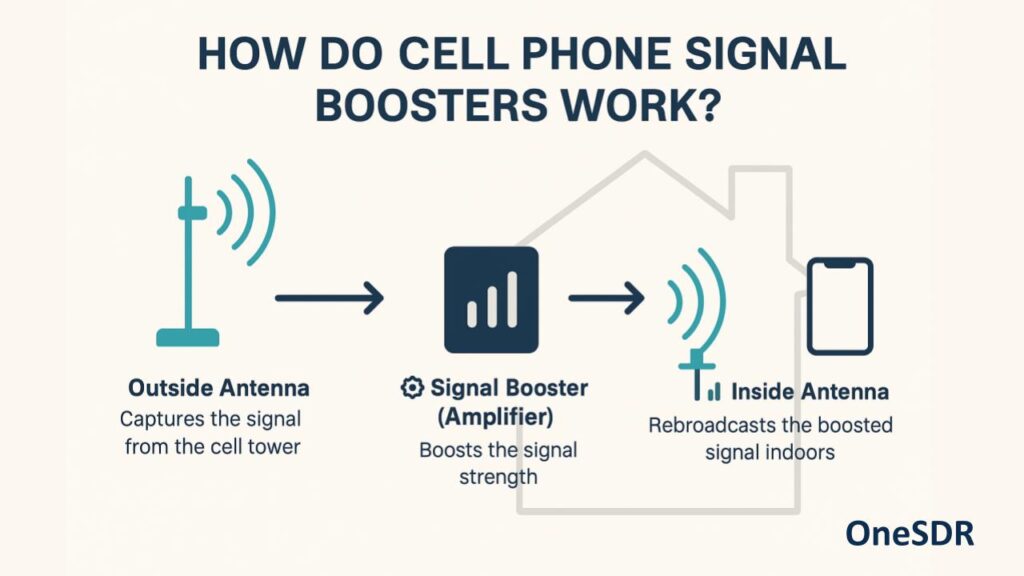🏠 If you’re dealing with poor cell phone reception, dropped calls, or slow data speeds, you might have considered investing in a cell phone signal booster. But how do you know if you really need one?
While signal boosters can certainly help improve reception in certain situations, they’re not always the right solution for everyone.
In this article, we’ll walk you through the key factors to consider when deciding whether you need a signal booster, and how to evaluate if it’s the best choice for your situation.
🏠 What is a Cell Phone Signal Booster?
Before we dive into whether you need a signal booster, let’s quickly explain what it is and how it works.
A cell phone signal booster is a device that amplifies weak cellular signals to improve your phone’s reception. It works by capturing the existing signal from a nearby tower, amplifying it, and then retransmitting the stronger signal inside your home, office, or vehicle.
Signal boosters typically consist of three main components:
- External Antenna: Captures the weak signal from the nearest cell tower.
- Amplifier: Boosts the signal strength.
- Internal Antenna: Rebroadcasts the amplified signal inside the building or vehicle.
🏠 Do You Need a Signal Booster?
Poor Cell Reception in Your Area
One of the most obvious signs you might need a signal booster is poor reception in your area. If you’re living or working in a location with weak or spotty cellular coverage—such as rural areas, remote locations, or buildings with thick walls—a signal booster can help improve your reception.
How to Know if You Have Poor Reception:
- Dropped Calls: If your calls frequently drop or get cut off.
- Low Bars: If your phone consistently shows only one or two bars of signal.
- Slow Data Speeds: Struggling to load websites, stream videos, or download files due to poor network speed.
If you experience these issues often, a signal booster could be the solution.
Your Home or Office is in a Dead Zone
Sometimes, buildings can create dead zones where the signal is weak or non-existent. For instance, basements, rooms with thick concrete walls, or areas deep inside multi-story buildings can block signals. Even if the signal is strong outdoors, indoor reception can suffer.
When a Signal Booster Can Help:
- Basements: Signal boosters are especially useful in basements, where signals from outdoor towers can’t penetrate.
- Large Homes or Offices: If your home or office is spread out over a large area, you may need a booster to cover every room.
A signal booster can extend the reach of your network and ensure consistent coverage throughout your home or office.
Multiple Users with Poor Reception
If your family, roommates, or employees are also struggling with weak signals, a signal booster can help improve the reception for multiple devices at once. Most signal boosters are designed to support multiple devices, ensuring everyone in the area benefits from the improved signal.
Rural or Remote Locations
People living in rural or remote areas often experience weak cellular reception. This is typically due to being far from cell towers, which means the signal strength is lower. If you live in a rural area where carrier service is sparse, a signal booster can significantly enhance your cellular experience.
📶 ⛺ Cell Phone Signal Boosters ⭐⭐⭐⭐
Why Rural Areas Struggle:
- Distance from Towers: Cell towers may be far away, which results in weak signals.
- Obstructions: Natural obstructions like mountains or valleys, and even dense forests, can block signals.
If you’re in a rural area and need better coverage, a signal booster can bring your signal strength to usable levels.
Vehicles with Weak Signals
If you’re often in a car, RV, or truck and experience poor cell reception while on the road, a vehicle signal booster could be a great investment. These boosters are designed to amplify the signal inside your vehicle, making it easier to make calls, send texts, or use mobile data while traveling.
When to Use a Vehicle Signal Booster:
- Long-Distance Travel: If you frequently drive through areas with weak coverage.
- Remote Locations: Areas where cell towers are few and far between.
A vehicle booster can help improve your signal when you’re on the move, especially in rural or mountainous areas.
Wi-Fi Calling and Internet Connectivity
Another reason you might consider a signal booster is to enhance your Wi-Fi calling experience. If your Wi-Fi network is strong but your cellular signal is weak, a booster can enhance Wi-Fi calling performance and reduce dropped calls.
Additionally, many people use signal boosters in conjunction with their internet connections. For example, if you use mobile data for internet access and have a weak signal, a booster will improve both your phone and data connectivity.
🏠 Alternatives to a Signal Booster
Before you decide to purchase a signal booster, it’s worth considering a few alternatives that may solve your problem without the need for additional equipment:
Wi-Fi Calling
If your internet connection is stable and strong, enabling Wi-Fi calling on your phone can be a great alternative. Many modern smartphones support Wi-Fi calling, which routes your calls and messages over your Wi-Fi network instead of the cellular network.
Network Extenders
Some carriers offer network extenders, which function similarly to signal boosters. These devices use your internet connection to improve cellular coverage in your home or office, specifically for voice calls.
Cellular Providers with Better Coverage
If you’re experiencing poor signal because your current carrier’s network is not reliable in your area, you might want to consider switching to a carrier with better coverage. Check out coverage maps from different providers to see which one offers the best signal in your area.
🏠 Conclusion: Is a Signal Booster Right for You?
A cell phone signal booster can be a game-changer if you’re struggling with poor reception, whether you’re at home, in the office, or on the go. If you experience weak signals or dropped calls frequently, or if you live in a rural or remote area, a signal booster is likely a worthwhile investment.
However, if you have a strong Wi-Fi connection and your cellular signal is weak inside your home, Wi-Fi calling or a network extender might also solve your problem without the need for a signal booster.
Ultimately, whether or not you need a signal booster depends on the specifics of your location, your carrier’s coverage, and your mobile usage. By evaluating these factors, you can make an informed decision about whether a signal booster is the right solution for you.



